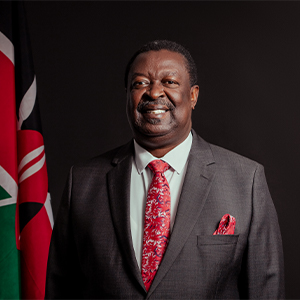
The Prime Cabinet Secretary embodies the adage that “Still waters run deep”. His quiet and mild manner conceals a passionate but steel nature. He has surprised many by pulling-off unexpected bold envious governmental and political decisions to the envy of his detractors. As Minister for Finance in the early 1990s, he did what was almost impossible under a central command economic system. At a young age of 33 years, he went about liberalising the Kenya economy with unseen zeal. A country that was an international aid and investment pariah bounced back into life with inflation reduced to a single digit from a high of 50%.
Out went forex exchange controls as the shilling was floated, import licenses scrapped and price controls abolished. State control of the telecommunications sector was abandoned and gave rise of Safaricom and its M-Pesa brand; mobile telephony; multiplication of TV and Radio stations. The process of autonomous institutions begun with establishment of the Kenya Revenue Authority (KRA), autonomy of the Central Bank of Kenya and the Retirement Benefits Authority.
His legacy projects as Member of Parliament for Sabatia Constituency where he served for three terms are;
- The Sabatia Community Development Fund (SACODEF), a Ksh.27 million capitalized revolving micro-enterprise credit scheme (1996) for youth and women groups, and educational scholarships. It is a Micro Credit Scheme precursor to current National Government Constituency Development Fund (NG-CDF).
- Construction of Health facilities within a 5-km radius walking distance foe vey home in Sabatia. Politically, he has been equally innovative and as unpredictable as the Savanna rains. Since the return to multiparty politics in Kenya in the 1990s, he has been the engineer behind election coalitions. In the 2000s, he rallied desperate leaders to join the new Orange Democratic Movement (ODM) outfit where he sat in its apex decision-making body – The Pentagon. He went on to lead the ODM team in the 2007 post-election National Accord negotiation and resulted in his serving as Deputy Prime Minister and Minister for Local Government. Here, his reformist credentials re-emerged to shine when he efficiently oversaw the legislative instalment of the current devolved system of government in Kenya. In subsequent elections, he was the architect behind formation of the Amani (2013), NASA (2017) and the Kenya Kwanza (2022) coalitions.
His “Earthquake Moment” at which gave an exhilarating Tusindanganyane Speech changed the 2022 election outcome in favour President William Ruto. His move to join up with Ruto in the Kenya Kwanza Coalition, not only legitimised Ruto in the electorate perception, but also a diplomatic coup as he brought his international networks to appreciate Ruto’s candidature as viable. The naysayers Often underrated, he is deeply enthusiastic about innovative ideas wherever he has worked in government. In Local Government, he spearheaded Disaster Management, Urban planning, Solid Waste Management and Rural Poverty Reduction programmes and projects. As Minister for Information, Communications and Transport, the liberalization of the communications sectors also led to establishment of the Communications Commission of (CCK) and modernization of the Kenya Civil Aviation Authority (KCAA) navigation facilities.
In Agriculture Ministry, he oversaw the enactment of Kenya Tea Development Agency (KTDA) Act that released ownership of Tea factories from Government to farmers’ ownership. In Marketing and Supplies where he started his Cabinet service, he was instrumental in abolishing movement permits for grain across Districts then, and oversaw the massive expansion of grain storage facilities across the country to ensure local food security. Any regrets?
“I always feel like a lone stowaway at sea when colleagues or nobody else wants to think about our collective future but to only to exist now. The viciousness with which I was ought for the changes I introduced taught me public service is not for the weak-kneed. Today, it also saddens me that some of the institutions that I helped set up to beef public service delivery and economic growth, were razed down by those managing them. Take tea the sector for instance; I never envisaged that a cartel that would fleece farmers would grow out of giving farmers ownership of the production, manufacturing and marketing value chain.” And that is the truth.
